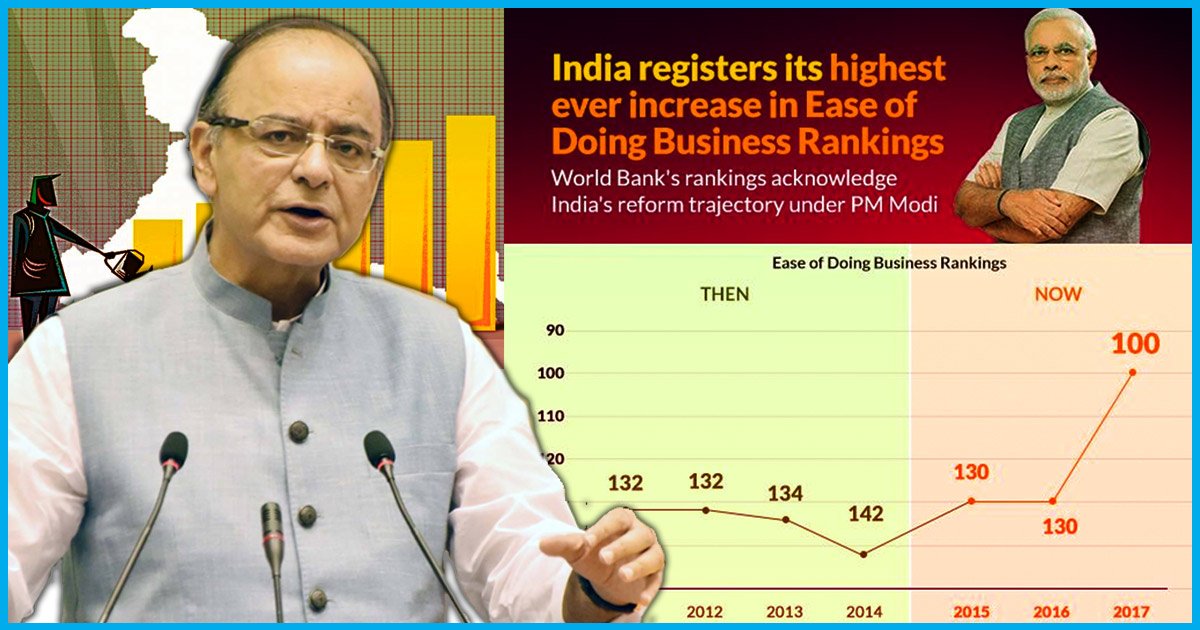
Good News: India Jumps 30 Places In Ease Of Doing Business According To World Bank Report
India jumped 30 ranks to secure the 100th position in the latest ease of doing business by the World Bank, in its Doing Business 2018 report, which was released on Tuesday. This report ranks India at the hundredth position among 190 countries. Last year, India was ranked at 130.
PM Narendra Modi who wants India to be on the top 50 of the aforementioned index said that this is a “historic” achievement. However, the country is ranked a poor 156th out of 190 countries on the parameter OF starting a business and 181st on granting construction permits. While sharing the details of this report Finance Minister Arun Jaitley said on Tuesday that the fact India has jumped from 142 to 100 in a span of three years, taking the country to the top 50 of the index is a feasible target which can surely be achieved.
“Indian government has been focussed on reforms and since the Modi government came to office, it began looking at this area, trying to understand what we measure, how we measure, what is its value and designed a reform programme that addresses some of the shortcomings that were measured by the indicators and this is the result of that…these things take some time to come to fruition,” said Ms Rita Ramalho of World Bank, according to a report by The Hindu.
Parameters of reforms
“India made big efforts in the last three years and what is seen is the report is not a result of the last year’s efforts only,” Ms Rita Ramalho said, adding that the methodology of the study captures the actual implementation of a particular reform once it is enacted. This, therefore, results in a scope of a time lag before it is reflected in the report. The report is in its fifteenth edition.
India’s upward jump in ranking is based on the underlying improvement in the distance to frontier (DTF) score. The DTF score benchmarks economies with respect to regulatory best practices. This is an absolute measure of progress towards the best practice. Here, in the report, India has recorded the fifth highest change in the above-mentioned score. India has also found a place in the top ten economies, thereby showing the most improvement in a given year.
Reforms noted by the report
The report, DOING BUSINESS report measures aspects of regulations followed by a country in 11 areas of the life of a business. India has made eight reforms in the last one year, which again is the highest number for a country in a single year. India is one of the three economies which have undertaken as many as eight reforms in the last one year. Reforms noted by the report are enlisted as follows:
- Faster permits for construction
- Combining the application of PAN and TAN (Tax Account Number) in a single submission.
- Reduction in the time needed to complete the applications for Employees Provident Fund Organisation (EPFO) and Employee’s State Insurance Corporation (ESIC)
- Reduction in export and import border compliance cost
- Improved access to credit
- Lower interests on larger loans
The World Bank official also said, “There are still significant changes possible, though the change this year is significant, both in relative and absolute terms.” Bank officials said India use to be last among the BRICS countries, but now it has overtaken Brazil in the list. Enforcement of contract is one of the major issues in doing business in the country. The time to enforce a contract has only become longer today, at 1445 days in comparison to 1420 days 15 years ago. This places India at the 164th position in the ranking on Enforcing Contracts indicator.
This report is a much-needed boost for the government which has to defend its economic policies amid criticisms over GDP growth rate hitting a three-year low in the April to June quarter.
What’s the reason behind India’s 30 step jump?
This report though holds true only for Delhi and Mumbai, but this ranking is a meticulously planned exercise. It began with World bank conducting a survey in two cities, unlike the pre-2016 methodology of calculating based on Mumbai alone, said a report by The Times of India.
The Department of Industrial Policy and Promotion had to face a bigger battle which drove the process of easing business in India. Amitabh Kant, the DIPP Secretary, three years back, chalked out a framework to deal with issues which would later reflect on the PM’s target to position India among the first fifty countries of the same World Bank ranking.
His successor Ramesh Abhishek took it forward by focussing on the utilities in Mumbai and Delhi. Getting power distributors of both the cities to move to an online system for easier connection and collection of payments, is one of the major changes which were reflected. Getting various approvals from local bodies was not an easy task earlier, but an online system has been brought into effect. India’s “Getting electricity” parameter has shot up from 170 in 2015 to 26 in 2017.
But, India still has a long way to go. Though the score has risen to 60.8 in comparison to 55.3, India still needs to work hard to improve in various sectors. There are red flags as well. India has fallen 16 places on the ease of registering a property. We surely hope, with such streamlining of processes in place, the dream which our Hon’ble PM has envisioned, i.e. India securing a position among the top 50, is not a far-fetched one.
 All section
All section













